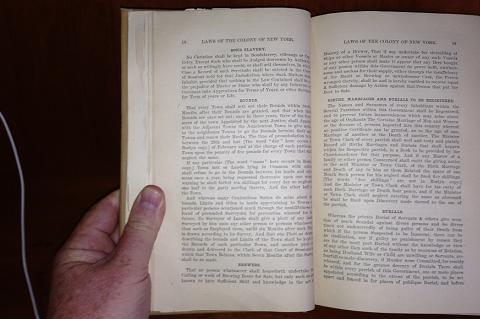Nothing more fun than asking the librarian if they happen to have a complete set of the colonial laws of the state of New York and being told that, yes, in fact that could be found right over there. The Duke of York’s Laws for his new royal colony from 1665. See, while most colonies were set up as private interests under a charter from the Crown, New York was to be the model and ultimately the administrative centre of Britain in North America. Or rather England at that point in time. Here is the full text which includes these provisions related to brewing:
That no person whatsoever shall henceforth undertake the Callingor work of Brewing Beere for Sale, but only such as are known to have Sufficient Skill and knowledge in the art or Mistery of a Brewer, That if any undertake for victualling of Ships or other Vessels or Master or owner of any such Vessels or any other person shall make it appear that any Beer bought of any person within this Government do prove unfit, unwholesome and useless for their supply, either through the insufficiency of the Mault or Brewing or unwholesome Cask, the Person wronged thereby, shall be and is hereby enabled to recover equal & Sufficient damage by Action against that Person that put the Beer to Sale.
What do we see? First, it regulates the sale of beer, not brewing. Second, you can’t sell a beer for drinking on board that sucks. That’s it. Pretty straight forward. One assumes that the ban on the sale of “unfit, unwholesome and useless” beer for ships was made law because if you were do that in the land word would get around pretty quickly. Off the coast in a whaler? Takes a bit more time and the unconscionable business practices by brewers might be not be the first thing on the mind compared to, say, not dying at sea. I do like the word “useless” as it implies “use” which begs the question what is the use of beer. As we all say together as we gather at the pub – sanitary hydration.
There are more detailed laws relating to the keeping of Inns and Ordinaries. You need a certificate from the local constable and a license from two justices if you are selling at a volume of less than a cask. The beer has to have at least four bushels of malt to a hogshead and doors close at nine at night. Prices are set and fines established. The interesting thing is that these general rules are still the sorts of rules you see today in laws in Ontario, the true descendant of colonial NY. The function of the public house or inn as a place of relative safety, food, drink and sleep is a necessary then and now.
By the way, nice meaty paw, no? It’s like a live action library shot. If there were library bubblegum cards and I was in a set, that would be my photo.


[Original comments…]
Craig – June 14, 2013 8:52 AM
A lawyer looking for laws. ‘Tis a good thing we have a legal eagle on board this beery ship, methinks.
Alan – June 14, 2013 10:17 AM
I love old laws, especially prior to a certain point in the language. These are good old plain words that would be understood by any literate person. What is the “use” of beer? Love it.
Nitch – June 16, 2013 10:28 AM
http://tastingnitch.com
Bear with the plebeian Nitch, but is that quote all one sentence?! Old documentation had such a liberal stance on writing, with it’s free form capitalization and fancy “that’s what is sounds like to me,” spelling. Why is “Mistery” capitalized and not “art” or any of the other dozen nouns. For that matter does “Mistery” mean to be the Mr. of Beere (now THAT has to be a typo, right). And, what is Mault?
Kudos to you, Sir, for being able to read that and translate it fluently in your head. Masters degree in library hounding or am I the only one who had to re-read the passage three times?
XOXO
Alan – June 16, 2013 12:42 PM
Good questions. It is one sentence but it is like a list of lists. See the two “That” at the beginning of a portion? A bit later and in law today there would be a semi-colon making the division more clear. “Mault” would be malt but I am not sure what the capitalization means in particular. Before a certain point there was a broader use of capitalization. In law now, capitalization means that somewhere else in the document you will find a definition of the term but I don’t think that is the case with “Mistery”. It might just mean “trade secrets” 350 years ago.
Gerry Lorentz – June 20, 2013 8:25 PM
Actually, the law does regulate brewing: “That no person whatever shall undertake the Calling or worke of Brewing beere for sale, but only such as are known to have Sufficient Skill in the art or Mistery of a Brewer.” It regulates who can brew and then regulates the product of their work. In England the Brewer’s guild would have regulated production and membership (through a legal charter), and the government would then have regulated sale. In this case, the government is regulating both. Not that this is a lot of regulation, but if a person did brew unwholesome or useless beer they would have been kept from brewing (at least from brewing after that point).
Alan – June 20, 2013 8:43 PM
Well, that is not “regulation” but prohibition. It does not set up either a bureaucracy of oversight or a even licensing process. In this system, a complaint would lead to an unskillful brewer to be hauled in front of a magistrate.